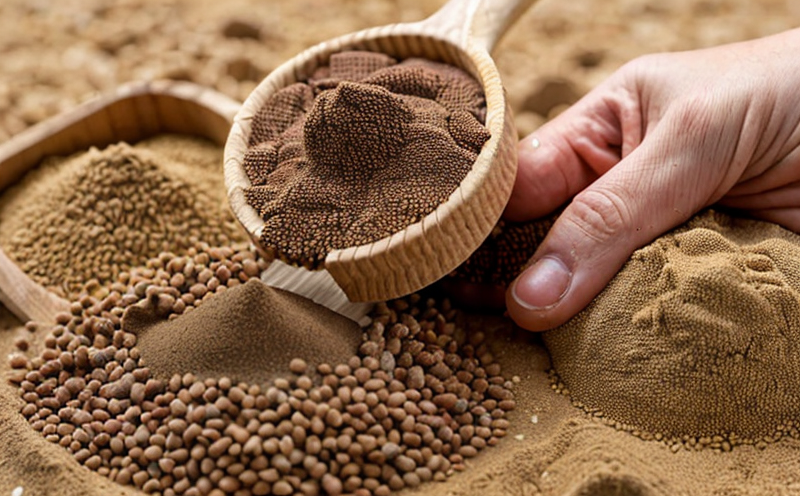Rapeseed Meal Quality Testing in Feed
The quality of rapeseed meal used as an ingredient in animal feed is critical to ensure optimal performance and health outcomes in livestock. Rapeseed meal, derived from the seeds of rape plants, provides a significant source of protein, energy, vitamins, and minerals essential for animal nutrition. Ensuring that this raw material meets strict quality standards helps prevent issues such as imbalanced nutrient profiles, potential contamination risks, and adverse effects on animal health.
At our laboratory, we specialize in comprehensive rapeseed meal testing tailored to the unique requirements of feed formulation and safety protocols. Our state-of-the-art facilities employ internationally recognized methods and standards to ensure accurate and reliable results. Below are some key parameters that form part of a thorough quality assurance process:
- Protein Content: Ensuring adequate protein levels is crucial for supporting animal growth and development.
- Fiber Content: Excessive fiber can lead to digestive issues, while insufficient fiber may result in poor nutrient absorption.
- Lipid Contamination: High lipid content can indicate rancidity or improper storage conditions, which can be detrimental to feed quality.
- Anti-Nutritional Factors (ANFs): These include substances like phytates and glucosinolates that can inhibit nutrient availability if not managed properly.
- Vitamin and Mineral Content: Ensuring these are within acceptable ranges is vital for supporting animal health.
We also perform mycotoxin testing to detect any potential fungal contamination, which can have serious implications for both animal health and feed safety. Additionally, we check for heavy metal levels such as arsenic, lead, cadmium, and mercury, ensuring compliance with international standards like ISO 21576:2018.
Our testing process begins with thorough sample preparation, which involves grinding the rapeseed meal to a consistent particle size. This step ensures uniform extraction of all components for accurate analysis. Following this, we use advanced instrumental techniques such as Near-Infrared Spectroscopy (NIRS) and High Performance Liquid Chromatography (HPLC) to measure protein content, lipid levels, and other critical parameters.
The results from these tests are then compared against industry benchmarks and our internal quality standards. Any deviations from acceptable limits are flagged immediately for corrective action. This rigorous approach guarantees that only high-quality rapeseed meal makes it into animal feed formulations, thereby enhancing overall productivity and sustainability in the agricultural sector.
Quality and Reliability Assurance
The quality assurance process at our laboratory is designed to meet stringent standards set by international bodies such as ISO 9001:2015. Our team of experts ensures that every sample undergoes meticulous examination using the latest technology available in the field. From sample preparation to final analysis, each step adheres strictly to predefined protocols to maintain accuracy and consistency.
We employ rigorous calibration procedures for all analytical instruments used during testing to ensure precision and reliability. Regular validation exercises are conducted to confirm that our methods remain up-to-date with current scientific knowledge and regulatory requirements. This commitment to excellence ensures that clients receive trustworthy data they can rely upon when making informed decisions about their feed ingredients.
To further enhance trustworthiness, we provide detailed reports for each test conducted, outlining all findings alongside recommended actions if any deficiencies are detected. These documents serve as valuable resources not only for internal reference but also for regulatory submissions where necessary. By maintaining such high levels of integrity throughout our operations, we strive to build long-term relationships based on mutual respect and shared goals.
Environmental and Sustainability Contributions
The production and utilization of rapeseed meal play significant roles in promoting environmental sustainability within the agricultural industry. By optimizing feed formulations that incorporate rapeseed meal, farmers can reduce their carbon footprint by minimizing reliance on imported protein sources which often have higher associated emissions during transportation.
Furthermore, using locally sourced rapeseed meal supports regional economies while reducing transport-related greenhouse gas emissions. Efficient use of this resource also helps prevent waste generation since every part of the seed is utilized effectively in feed production rather than being discarded.
Incorporating rapeseed meal into livestock diets contributes positively to soil health when manure is returned post-meat or milk production cycles as it enriches the land with valuable nutrients. Additionally, growing rape plants themselves contribute to biodiversity by providing habitats for beneficial insects and pollinators.
Our laboratory’s role extends beyond just testing; we actively promote best practices that contribute towards sustainable agriculture through education and consultation services aimed at helping stakeholders adopt greener approaches in their operations.
Competitive Advantage and Market Impact
In today’s competitive market, maintaining superior feed quality is not only beneficial for animal welfare but also plays a key role in establishing a company's reputation as a leader in sustainable agriculture practices. By ensuring that rapeseed meal meets or exceeds industry standards, businesses can demonstrate their commitment to delivering top-notch products.
Customers looking for suppliers who adhere strictly to quality control measures will find our services particularly appealing because it allows them to consistently offer premium feeds across various species including cattle, sheep, pigs, poultry, and aquaculture. This consistency leads to higher customer satisfaction rates among end-users such as farmers, pet food manufacturers, and institutional buyers like universities or research institutions.
The ability to provide reliable test results also opens up opportunities for innovation within the feed industry by enabling developers to experiment with new blends of rapeseed meal combined with other ingredients. This flexibility allows companies to stay ahead of trends in nutrition science while addressing changing consumer demands related to health and environmental concerns.





